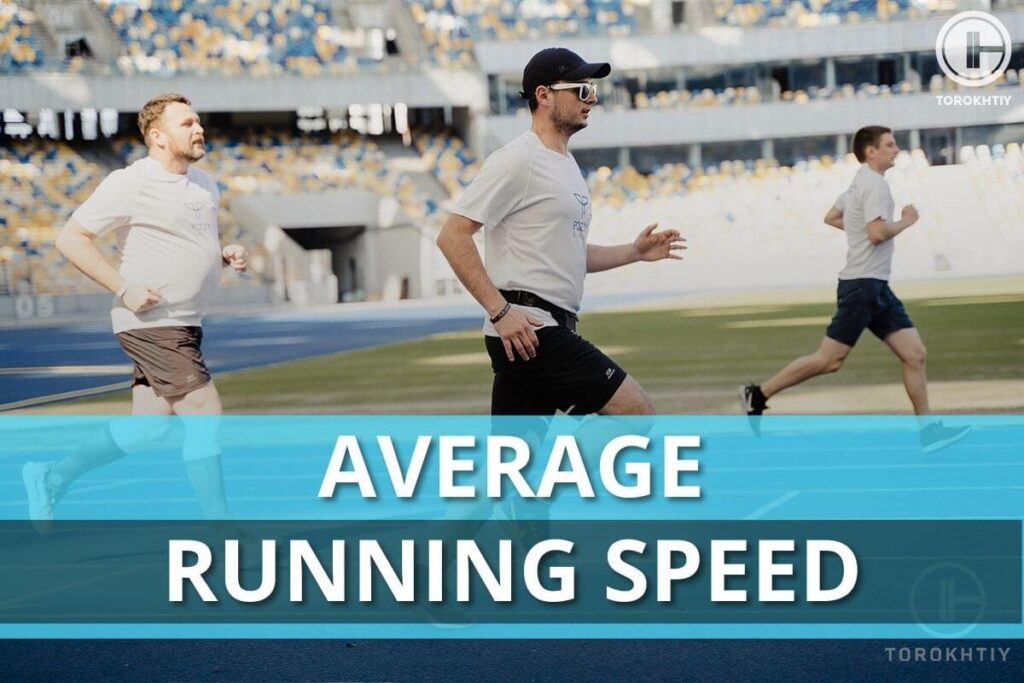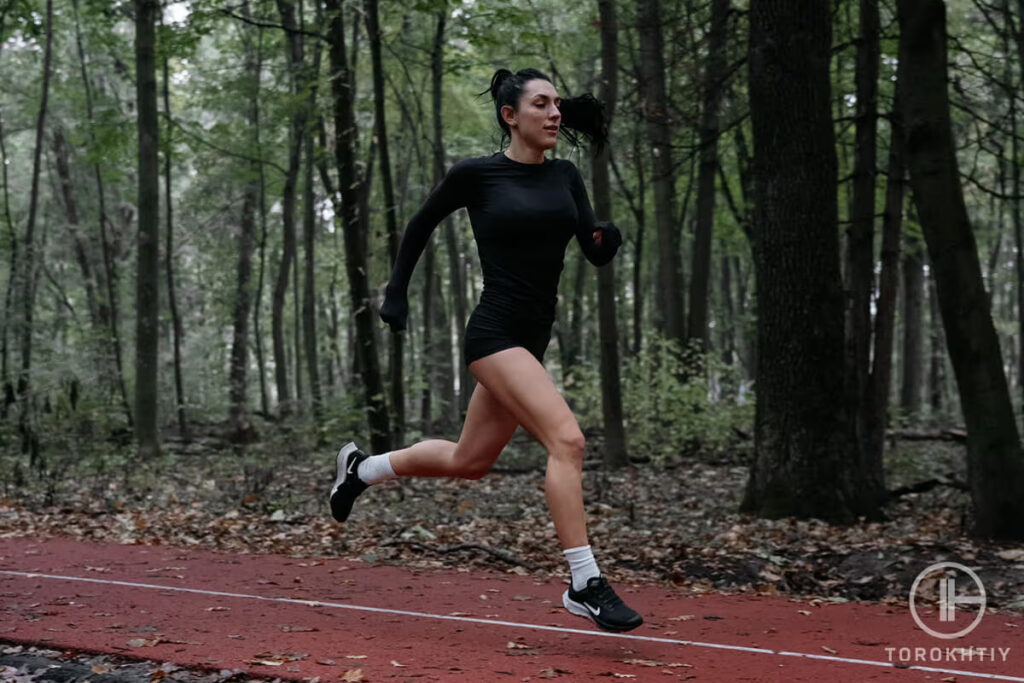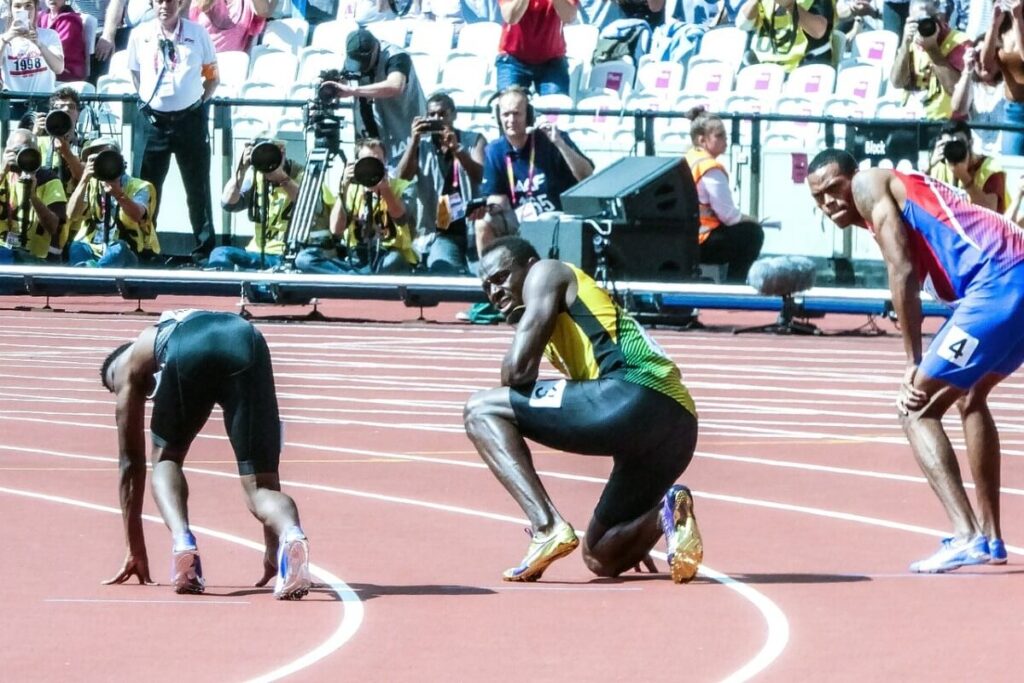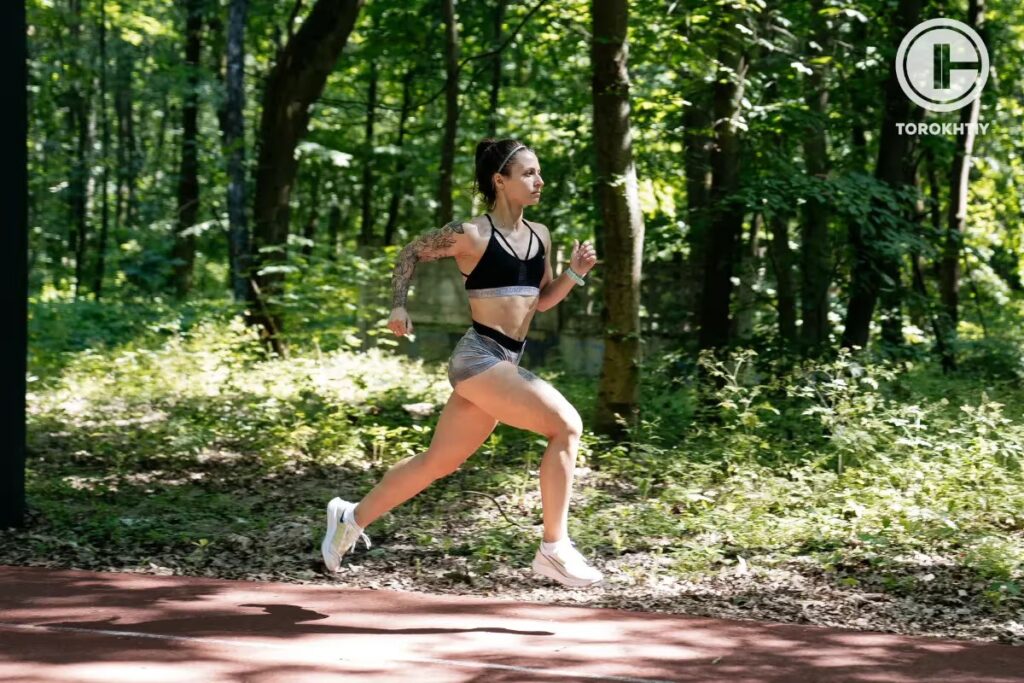Average Running Speed by Age, Sex & Level
Author:
Unlock your full potential by engaging with our experts and community! Have questions about your fitness journey or looking for expert advice on weightlifting techniques? Don’t hesitate — leave a comment below and Oleksandr Zagrebelnyi will provide a personalized answer and insights to help you reach your goals.
Torokhtiy is reader-supported. Some links are affiliate links, and we may earn a commission at no extra cost to you. See our disclosure page for details.
When it comes to running, knowing the average speed a human can run proves to be both informative and motivating. The average human running speed sheds light on the typical pace that individuals can achieve. Whether you’re a beginner or an experienced runner, understanding this average speed can aid in your training and overall performance.
The average human running speed for the mile is approximately 7 minutes and 31 seconds, just under 8 mph. Both males and females can run at speeds ranging 5 – 9 miles per hour. It’s important to note that training, genetics, and overall fitness can influence an individual’s average running speed.

What Is Running Ability And Average Speed Depending On Sex?
So, how fast does the average person run? Well, the ability to run and the average speed at which individuals run vary depending on whether they are male or female. Both genders exhibit distinct performances when it comes to running. Let’s delve into the average speed for male runners and the average running speed for female runners.
1. Average Speed For Male Runners
Although the 8 mph human speed tends to be the most famous male average speed.
However, the average running speed in mph for males falls in a range between 5 to 9 miles per hour (mph) or approximately 8 to 14 kilometers per hour (km/h).
It is important to note that individual performance can vary significantly, and some male runners may surpass these averages.
2. Average Running Speed For Female Runners
Compared to males, females generally exhibit slightly different running speeds on average.
The average running speed for female runners typically ranges from 4.5 to 8.5 mph or approximately 7 to 13.5 km/h.
Just like male runners, individual capabilities may surpass or fall below these averages due to various factors, such as training, genetics, and overall fitness level.
It is crucial to remember that while average human running speed provides a general guideline, individual abilities can significantly differ. While the average human running speed in km/h is 10.62 kph, factors such as experience, body composition, and natural talent also influence running performance. Therefore, it is important for each runner to focus on personal progress and set achievable targets.
Running Time Calculator: Individual’s Average Running Speed
Let’s use this calculator to estimate how fast you will be able to cover your own individual distance.
Running Time Calculator
Result:
5 Factors That Influence Average Running Speed
When it comes to the average running speed of a human, several factors come into play, influencing performance and determining individual capabilities. Let’s explore these factors in detail.
1. Age
Age plays a significant role in determining average running speed. As individuals progress through different stages of life, their physical abilities and running performance can be influenced.
Comparing Average Running Speeds Across Different Ages
| Age | Average Running Speed (mph) |
|---|---|
| 10 | 5.06 |
| 15 | 6.00 |
| 20 | 9.06 |
| 25 | 9.06 |
| 30 | 9.02 |
| 35 | 8.92 |
| 40 | 8.61 |
| 45 | 8.38 |
| 50 | 8.07 |
| 55 | 7.80 |
| 60 | 7.43 |
2. Gender
Gender is another factor that affects average running speed. On average, males tend to have faster-running speeds compared to females due to physiological differences such as muscle mass and hormone levels. However, it’s important to note that individual capabilities can vary.
Average Running Speed For Males And Females
| Age | Average Male Running Speed (mph) | Average Female Running Speed (mph) |
|---|---|---|
| 20 | 9.06 | 8.07 |
| 25 | 9.06 | 8.07 |
| 30 | 9.02 | 7.92 |
| 35 | 8.92 | 7.78 |
| 40 | 8.61 | 7.44 |
| 45 | 8.38 | 7.25 |
| 50 | 8.07 | 7.02 |
| 55 | 7.80 | 6.68 |
| 60 | 7.43 | 6.38 |
3. Running Level
The running level or experience of an individual also plays a role in average running speed. Beginners may start with lower speeds and gradually progress as they improve their fitness and running technique. Intermediate runners often achieve moderate speeds, while advanced runners excel with faster paces.
Average Running Speeds By Experience Level
| Age | Beginner (mph) | Intermediate (mph) | Advanced (mph) |
|---|---|---|---|
| 20 | 6.37 | 9.06 | 10.43 |
| 25 | 6.37 | 9.06 | 10.43 |
| 30 | 6.35 | 9.02 | 10.43 |
| 35 | 6.29 | 8.92 | 10.29 |
| 40 | 6.03 | 8.61 | 9.94 |
| 45 | 5.85 | 8.38 | 9.63 |
| 50 | 5.61 | 8.07 | 9.18 |
| 55 | 5.38 | 7.80 | 8.88 |
| 60 | 5.16 | 7.43 | 8.47 |
4. Distance
The distance being covered greatly affects the average running speed of a human. Shorter distances, such as sprints or 5K races, require bursts of high-intensity effort, resulting in faster speeds. These distances demand explosive power and speed. On the other hand, longer distances, like marathons or ultramarathons, demand sustained endurance and a more moderate pace.
For short distances, the peculiarity lies in the explosive nature of the effort. Runners focus on generating quick bursts of energy and maximizing speed. In contrast, longer distances test runners’ ability to sustain their pace over extended periods.
Marathons deserve special mention due to their unique demands. These 26.2-mile races require a balance between endurance and speed. Runners aim to maintain a steady pace that allows them to complete the distance without exhausting their energy reserves too early.
Average Mile Pace By Distance For Men And Women
| Race distance | Men’s Pace (min/mile) | Women’s Pace (min/mile) |
|---|---|---|
| 5 km (3.1 mi) | 7:00-9:25 | 7:45-10:15 |
| 10 km (6.2 mi) | 7:15-9:55 | 8:05-11:00 |
| half-marathon (13.1 mi) | 8:05-11:00 | 8:50-11:50 |
| Marathon (26.2 mi) | 8:35-11:45 | 9:20-12:55 |
5. Type Of Running
The type of running, whether it’s sprinting, jogging, or other variations, significantly impacts average running speed. Different types of running have distinct characteristics and average speeds associated with them. Just as the average human sprint speed which approximates 10 12 mph.
Average Speed For Different Running Styles
| Running Type | Average Running Speed (mph) |
|---|---|
| Sprinting | 10 – 12 |
| Jogging | 6 – 8 |
| Tempo Run | 7 – 9 |
| Long Slow Run | 5 – 7 |
3 External Factors Affecting Running Speed
Achieving and improving average running speed is not solely dependent on individual capabilities and training efforts. To answer just how fast does the average person run? We see that external factors can also significantly impact the average running speeds. Let’s explore some key external factors that affect running speed.

1. Terrain
The terrain on which you run plays a crucial role in determining your average running speed. Different surfaces, such as pavement, trails, or treadmills, have varying levels of impact and resistance.
Softer surfaces like grass or dirt trails can provide more cushioning and reduce the impact on joints, potentially allowing for faster speeds. On the other hand, running on harder surfaces like concrete or asphalt may lead to more impact and slower speeds.
2. Weather
Your running pace can be significantly impacted by the weather. Extremes in temperature, humidity, or cold might impair your body’s capacity to function at its peak. Fatigue can worsen in hot, muggy weather, making it difficult to keep up a quick pace. On the other hand, cold temperatures may have an impact on flexibility and muscular function.
3. Altitude
Another element that may impact your running pace is altitude. Running at higher elevations causes the air to become thinner, which lowers the amount of oxygen available. Slower running speeds and a deterioration in aerobic capacity may result from this drop in oxygen levels.
3 Ways To Improve Your Running Pace
The running pace is the rate at which you move, sometimes expressed in terms of minutes per mile or km. It is essential to get your target average running pace and assess your overall performance. The following advice can help you increase your average running pace:
1. Interval Training
Incorporating interval training into your running routine can be highly effective in improving your pace. This training method involves alternating between high-intensity bursts of speed and periods of active recovery. This type of training helps increase your cardiovascular fitness, build endurance, and develop speed, which in turn helps in increasing the average male running speed.
2. Tempo Runs
During a tempo run, you maintain a comfortably hard pace for a sustained period, typically around your lactate threshold. This threshold represents the point at which your body starts producing lactic acid faster than it can clear it away. By running at this threshold, you train your body to tolerate higher levels of lactic acid and sustain a faster pace for longer periods.
3. Strength Training
Don’t undervalue the role that strength training plays in increasing your running speed. A body that is strong and steady can move more quickly and produce more force. To develop leg strength, concentrate on lower-body workouts like squats, lunges, and calf lifts.
Hoka Bondi 8
- Material: Breathable and supportive mesh upper
- Sole Material: Full-length EVA midsole for maximum cushioning
- Outsole (tread feature): Durable rubber outsole with a unique lug pattern
- Drop: 4mm
- Season: Suitable for all seasons
- Special Features: Exceptional cushioning and comfort
- Size: Available in various sizes
- Type: Maximum cushioning running shoe
If you want excellent running or walking shoes or just footwear you’ll be comfortable in, you can’t go wrong with the Hoka Bondi 8.
It’s been upgraded and now they have lighter, softer materials and a new extended heel design. The heel design gives a super soft, balanced feeling from th emoment your heel hits the ground to when you push off with your toes.
As far as the weight goes, it’s around 10.80 ounces, and the heel drop is 4 mm. They’re not too heavy and the lower drop is a good balance between cushioning and feeling connected to the ground.

The Bondi 8 is focused on cushioning and keeps things simple. There’s a good amount of support without any extra stuff that you don’t really need and that would only jack up the price. Take the rear crash pad, for example – it makes for a soft, smooth ride, which is perfect if you like to run outdoors.
The upper part is made of engineered mesh, which is breathable and keeps your feet cool and dry. The tongue and collar have memory foam and mold to your foot shape. All of these features make the fit snug but flexible, which is exactly what you would want.
The Bondi 8 is eco-friendly because it uses recyclable materials in parts like the mesh and the sockliner. Plus, the shoes are completely vegan, which (if that’s important to you) is nice!
What Is The Fastest Running Speed Ever Recorded?
When it comes to running, the human potential seems limitless. Throughout history, remarkable athletes have shattered records, pushing the boundaries of speed and endurance. Apart from the average running speeds, let’s delve into the world of record-breaking performances and explore the fastest running speeds ever recorded.

1. Usain Bolt
Usain Bolt, who is commonly considered the fastest man to ever live, is one famous example. With a time of astounding 9.58 seconds, Bolt broke the 100-meter sprint world record in 2009. He enthralled fans all around the world with his enthralling speed and graceful stride.
2. Florence Griffith-Joyner
Florence Griffith-Joyner sometimes referred to as Flo-Jo, is a well-known sprinter. She established the current women’s 100-meter sprint world record in 1988 with an impressive timing of 10.49 seconds.
3. Hicham El Guerrouj
In 1999, Hicham El Guerrouj achieved a remarkable feat by setting the world record for the mile run. Surpassing the usual human speed of 8mph, he completed the mile in an astonishing time of 3 minutes and 43.13 seconds. The mile is an iconic event that showcases both speed and endurance, making El Guerrouj’s achievement truly exceptional.
4. Sifan Hassan
The fastest run mile by a female athlete is 4 minutes 12.33 seconds. It was achieved by Sifan Hassan, who represented the Netherlands at an IAAF Diamond League meeting in Monaco on July 12, 2019.

FAQ
Is 15 Miles Per Hour Fast For A Human?
It is indeed considered fast for a human. The average running speed for most individuals ranges between 5 to 12 miles per hour (8 to 19 kilometers per hour). Achieving a speed of 15 miles per hour requires exceptional fitness and training.
Is Running At 7 Mph Fast?
Yes, running at 7 miles per hour can be considered fast. This pace translates to approximately 11 kilometers per hour. It surpasses the average human sprint speed and indicates a good level of fitness and endurance.
What Is The Average Running Speed For An Olympic Athlete?
The average running speed for an Olympic athlete varies depending on the event. Elite athletes may reach speeds of nearly 27 miles per hour (43 kilometers per hour) in short sprints like the 100-meter dash. The average speed in longer-distance competitions, like the marathon, is around 12 to 13 miles per hour (19 to 21 km per hour).
conclusion
In conclusion, a variety of variables, including age, gender, distance, and running experience, affect average running speed. The usual human running pace falls between 8 and 19 kilometers per hour (or 5 and 12 miles per hour).
Individual running speeds might vary depending on training, fitness condition, and inherent talent. Individuals may enhance their running efficiency and establish reasonable objectives by being aware of these elements.
Also read:
References:
- Human running performance from real-world big data // PubMed: https://pubmed.ncbi.nlm.nih.gov/33024098/
- Sprint and endurance power and ageing: an analysis of master athletic world records // PMC: https://www.ncbi.nlm.nih.gov/pmc/articles/PMC2660943/
- Average Running Speed by Age and Ability – Adults and Kids // Calories Burned HQ: https://caloriesburnedhq.com/average-running-speed/
- What’s the Average Running Speed and Can You Improve Your Pace? // Healthline: https://www.healthline.com/health/fitness-exercise/average-running-speed#speeds
- Effect of high-speed running on hamstring strain injury risk // BMJ Journals: https://bjsm.bmj.com/content/50/24/1536
- Fastest run one mile (female) // Guinness World Records: https://www.guinnessworldrecords.com/world-records/fastest-run-one-mile-(female)
- Photo by Usain Bolt, Pixabay, photos by Torokhtiy Media Team
Why Trust Us?
With over 20 years in Olympic weightlifting, strength training, nutrition coaching, and general fitness our team does its best to provide the audience with ultimate support and meet the needs and requirements of advanced athletes and professional lifters, as well as people who strive to open new opportunities and develop their physical capabilities with us.
By trusting the recommendations of our certified experts in coaching, nutrition, and sports training programming, as well as scientific consultants, and physiotherapists, we provide you with thorough, well-considered, and scientifically proven content. All the information given in the articles concerning workout programming, separate exercises, and athletic performance, in general, is based on verified data.
The product testing process is described in more detail here.
Oleksandr is a running coach and member of the Nike Run Club coaching team for 8 years. A participant in national and international competitions at distances from one kilometer to the ultra trail. Owner of mountain trail running camps. Nowadays Oleksandr is responsible for creating running training programs for athletes of various levels, coaching personally offline and online, conducts trail running camps in the mountains, participates in competitions.




Still have questions after reading our article? Unlock your full potential by engaging with our experts and community! Don’t hesitate — leave a comment below and Oleksandr Zagrebelnyi will provide a personalized answer and insights to help you reach your goals.